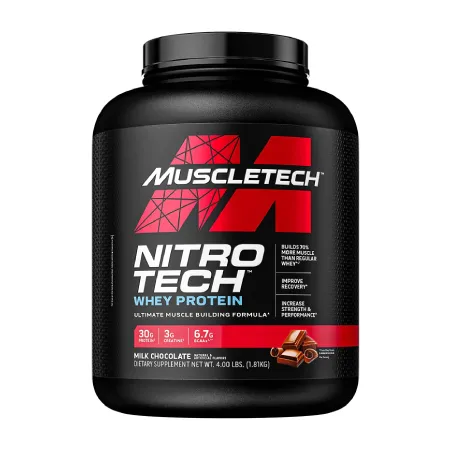As people become more health-conscious, they seek out various supplements to enhance their athletic performance and achieve their fitness goals.
Two popular supplements are creatine and whey protein powder. Creatine has been shown to improve muscle strength, power, and endurance, while whey protein powder provides the necessary protein to build and repair muscle tissue.
But can you mix creatine with protein powder?
This article will explore the benefits of combining these two supplements, dosage recommendations, how to choose high-quality supplements, staying hydrated, and potential side effects.
Can You Mix Creatine with Whey Protein Powder?
The short answer is yes, you can mix creatine with protein powder. Creatine and whey protein powder serve different purposes and can complement each other to enhance your overall performance and results.
When you mix creatine with whey you get the best of both worlds. Creatine can help improve your strength, power, and endurance, while protein powder can help you build and repair muscle tissue.
You can mix also mix creatine with whey protein and milk. In fact, many people choose to do so as it can be a convenient and effective way to consume both supplements at the same time.
Mixing creatine with whey protein and milk can be beneficial as milk provides carbohydrates and additional protein, which can help support muscle growth and recovery
Here is a quick overview and comparison of whey and creatine:
| Whey | Creatine | |
|---|---|---|
| Function | Provides essential building blocks to build and repair muscle tissue. | Provides energy to muscles during high-intensity activities like weightlifting or sprinting. |
| Benefits | Helps build and maintain muscle mass, supports muscle recovery after exercise. | Improves muscle strength, power, and endurance. |
| Source | Derived from milk, soy, or other plant-based sources. | Helps build and maintain muscle mass, and supports muscle recovery after exercise. |
| Dosage | Generally, 0.8-1.2 grams of protein per kilogram of body weight. | 3-5 grams per day. |
| Timing | Can be taken any time of day, but often consumed after exercise to support muscle recovery. | Best taken with a meal or post-workout to support energy production during exercise. |
| Side Effects | Can cause digestive issues like bloating, nausea, and diarrhea in some people. | Can cause digestive issues and dehydration if not taken with enough water. |
| Precautions | Choose high-quality products free from harmful additives or contaminants. | Follow recommended dosages and consult with a healthcare professional before starting supplementation. |
| Compatibility with Other Supplements | Can be mixed with creatine for enhanced muscle-building and recovery benefits. | Can be mixed with protein powder for enhanced muscle-building and energy benefits. |
How Creatine and Protein Powder Complement Each Other
Creatine provides your muscles with energy during high-intensity activities, like weightlifting or sprinting.
Protein powder, on the other hand, provides the necessary building blocks to build and repair muscle tissue.
When taken together, creatine can improve your athletic performance, while protein powder can help you build and maintain muscle mass.
Dosage Recommendations for Creatine and Whey Protein Powder
The recommended dose for creatine is 3-5 grams per day, taken with a meal or post-workout. The dosage for protein powder can vary depending on your body weight and fitness goals.
Generally, people should consume between 0.8-1.2 grams of protein per kilogram of body weight.
If you’re an athlete or bodybuilder, you may need to consume more protein to support your muscle-building goals.
Whey Protein Powder With Creatine
If you’re looking to mix creatine with protein powder you may want to consider this whey protein powder by MuscleTech which includes 6.7g of creatine per serving.
MuscleTech Nitro-Tech Whey Protein Powder
Best Tasting Whey Protein Powder With Creatine For Muscle Gain And Recovery

Supplement Facts
Per 1 scoop serving of 46g: 160 calories, 30 g protein, 4 g carbs, 3 g fat (1.5 g saturated), 2 g sugar, <1 g fiber, 270 mg sodium
When is the best time to take protein powder and creatine?
The best time to take protein powder and creatine depends on your individual goals and needs.
For protein powder, it’s generally recommended to take it within 30 minutes after a workout to help kickstart the muscle recovery process.
On the other hand, creatine is often taken before a workout to help increase strength and endurance during the workout. Some people may also take creatine after a workout to aid in muscle recovery and growth.
If you are taking protein powder and creatine together, the timing may vary depending on your goals. Some people prefer to take both supplements before a workout to help improve performance, while others may take them after a workout to aid in muscle recovery and growth.
However, it’s important to note that mixing creatine and protein powder in the same shake may cause the creatine to break down more quickly, potentially reducing its effectiveness.
Staying Hydrated When Taking Creatine and Protein Powder
Both creatine and protein powder can cause dehydration if you’re not drinking enough water. It’s important to drink at least 8-10 glasses of water per day to stay hydrated. Drinking enough water will also help your body absorb the supplements more effectively.
While creatine and protein powder are generally safe supplements, there are some precautions and potential side effects to keep in mind. Creatine can cause digestive issues like bloating, nausea, and diarrhea.
It may also cause dehydration if you’re not drinking enough water. Protein powder can cause digestive issues in some people, but it’s generally well-tolerated.
Make sure to follow the recommended dosages and consult with a healthcare professional before starting any new supplements.
Conclusion: Mixing Creatine and Protein Powder for Better Results
Mixing creatine with protein powder can be a great way to enhance your athletic performance and build muscle.
Creatine and whey protein powder serve different purposes, but when taken together, they complement each other to enhance your overall results.
Make sure to follow the recommended dosages, choose high-quality supplements, and stay hydrated to get the most out of your supplementation.

